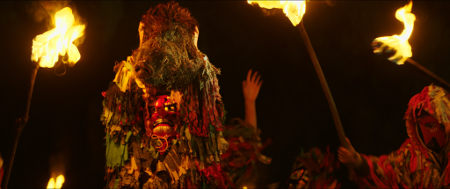O Ornitólogo
366 Weird Movies may earn commissions from purchases made through product links.
DIRECTED BY: João Pedro Rodrigues
CAST: Paul Hamy, Xelo Cagiao Teijo, Han Wuen, Chan Suan
PLOT: After being swept away by rapids, Fernando, an ornithologist looking for black storks, finds himself in a mysterious forest where he’ll undergo a transformative spiritual journey mirroring the life of Saint Anthony of Padua.

WHY IT SHOULD MAKE THE LIST: The Ornithologist is the allegorical tale of an atheist ornithologist’s conversion through a succession of increasingly bizarre occurrences. Given that these moments vary from slightly odd to truly surreal, the film plays the weirdness card, although the limited number of remaining slots in the List make its inclusion uncertain.
COMMENTS: The first shots of The Ornithologist, after an introductory quote by Saint Anthony, depict a dark, calm river with a bird and plant life, accompanied by the ambient sounds of nature. After the film’s weird notes kick in, the atmosphere remains remarkably the same: quiet and naturalistic, persistently treating the strange sights of Fernando’s mystical journey as perfectly normal. The stunningly shot setting, a Portuguese forest that director João Pedro Rodrigues populates with strange images and figures, also persists for the entirety of the movie (save for the very last, and very weird, scene).
After he crashes his kayak, the titular protagonist is rescued by two female Chinese pilgrims, on their way to Santiago de Compostela, with whom he spends the night. This moment marks the film’s first foray into Fernando’s symbolic journey, as well as a turn to a darker tone. When a menacing sound is heard, the frightened pilgrims assume it’s a demonic entity just as quickly as Fernando casually rebuts their belief, claiming there’s no God or Devil. Shocked by his lack of faith, they oblige him to sleep outside of their tent, and the next morning finds him tied to a tree.
From that point on, the steps on the ornithologist’s conversion grow progressively surreal; some are blatant in their symbolism (such as the appearance of the Holy Spirit as a white dove), others more obscure (naked amazons shooting him with a rifle, only to have a quick chat with him after he revives). Most are blasphemous and/or contain homoerotic undertones. They include Fernando’s baptism in urine (!), sex with a mute shepherd named Jesus (!!!), and the appearance of what appear to be embalmed animals in the woods, among other outrageous stops in his mystical-existential self-discovery arc.
These episodes are consistently engaging and reveal Rodrigues’ fascination with Christian iconography, mysticism and eroticism (a potently heretical mix), as well as his intention to filter universal religious symbols through his personal sensibilities. The “enlightenment quest” narrative will likely remind weirdophiles of Alejandro Jodorowsky’s El Topo or The Holy Mountain, but the film is stylistically much closer to Apichatpong Weerasethakul’s Uncle Boonmee Who Can Recall His Past Lives. Like that film, The Ornithologist‘s bizarre and phantasmagorical apparitions seamlessly blend in the environment as if they were no less natural than a tree or a bird. Accordingly, our main character remains stoic throughout his adventure. Speaking only when needed (that is, sparsely), his language, like the film’s, is mostly non-verbal. Actor Paul Hamy subtly conveys feelings of confusion and curiosity; interestingly, he has explained in interviews that he likes physical expression, comparing himself to a sculpture that the director shapes in front of the camera. The Ornithologist displays this particularly well, as Hamy’s character is aloof and his metamorphosis occurs internally, manifesting itself mostly in his careful physicality and expressions.
Even if you have difficulty relating to Fernando, it’s apparent that this is a very personal affair for Rodrigues. At one point near the end, the director himself literally steps into the shoes of the main actor. The character’s name changes to António (another reference to Saint Anthony), signalling that his transformation is complete. Fernando is not meant to be an avatar of the audience but, rather, of his creator; as a result, viewers without familiarity or investment in the narrative of Saint Anthony may find themselves estranged. The story is clearly very important to Rodrigues, and ultimately asserts itself as vaguely autobiographical. This is not to say, however, that its deeper meaning is impenetrable. Surely, watching The Ornithologist is, above all, an experience, and the beautiful cinematography and pervading atmosphere, languid and sometimes sinister, will please the adventurous viewer. But I believe exploring the film’s symbolism is a rewarding enhancement. Like Fernando, we feel shipwrecked and disoriented in such a strange environment, but by the end, we’ll probably have changed.
WHAT THE CRITICS SAY:

“O Ornitólogo” is a really great (and weird) film. It sure would be fantastic to have a Portuguese entry in the 366 final list.